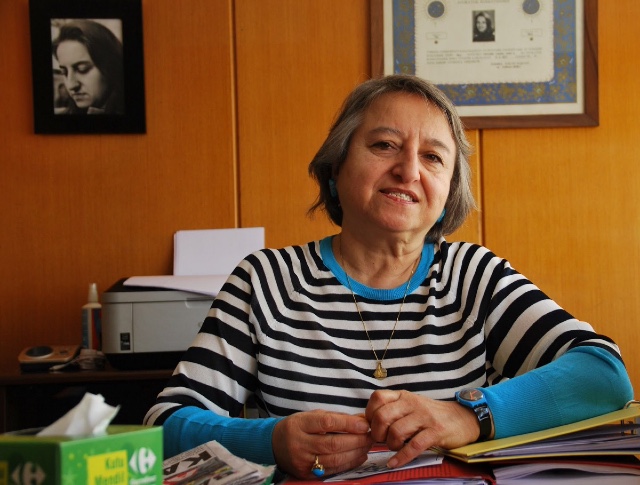Through articles by and interviews with feminists who are experts in their respective fields, 5Harfliler’s “Istanbul Convention Brief” investigates the significance of the Istanbul Convention in the fight against gender-based violence, and what it would mean for women if Turkey were to withdraw. Tuğçe Yılmaz is the editor-in-chief of the series.
Turkey was the first country to sign the Istanbul Convention, and now, it is under scrutiny by the government. The consideration to withdraw from it puts the Convention on the agenda of the women’s movement once again. The Convention must be treated as a priority issue and not interpreted as a means to cover up something grander happening in the background, since the discussions around withdrawing have been going on for a long time. Only a couple of months ago, this discussion was limited to a circle close to the government, whereas now, the government is seriously considering it. Some news outlets reported that it was discussed during the most recent central executive board meeting of the Justice and Development Party (AKP).
We interviewed M. Canan Arın, a prominent feminist attorney-at-law, to better understand the framework of the discussion on and around the scope of the Convention, which is being targeted on social media and television, and to analyze the reasons political parties have put forth to justify their withdrawal from the Convention.
Let’s start with the basics: Why is the Istanbul Convention so important for women?
Signatory countries to the Istanbul Convention agree to “protect women against all forms of violence and prevent violence against women.” The state, in order to protect women, has to open shelters, and train authorities with whom women have contact, such as the police. Also, the jurisdiction should allow for shifting the burden of proof from women who are survivors of violence to the defendant and to create provisions for restraining orders against the perpetrators of violence. The Convention also encourages “to punish the perpetrators of violence, in cases where states fail to prevent violence, and finally to create policies that protect women from violence.”
How is violence against women defined in the Istanbul Convention?
The Convention considers all forms of oppression and dominance imposed on women and their bodies as violence. The United Nations adopted a rather comprehensive definition of violence against women, inclusive of all practices that expose them to violence on the basis that they are women, and all forms of oppression that cause pain and suffering to women. I define violence as all methods by which the powerful impose and sustain their power over the weak, and all forms of oppression that feed gender inequality .
There is an opposition against the Istanbul Convention and its articulation in Law No. 6284 for they allegedly “victimize” men. What are the arguments of those opposing the Istanbul Convention?
A recent poll by Istanbul Economy Research, unfortunately, showed that the majority of the people have not read the Convention yet. There were certain participants in this study who confused the Convention with the Montreux Convention Regarding the Regime of the Straits (signed in 1936). This raises the question as to why people are against a Convention they have not even read. The answer is simple: because the government wants so. How about those who’ve read the Convention and position themselves against it? They are against women’s autonomy and strengthening of the women’s movement. Women no longer want to be in a relationship where they are experiencing violence, and they are more autonomous. This is interpreted as an attitude that shakes the foundations of patriarchal authority. Men are afraid of women and the Convention. Moreover, they are not at ease with our earned rights written in the Civil Code. Men see this as a power struggle that can damage the roots that feed their manhood.
As the discussions continue, the number of women murdered is increasing…
Yes, and I have a genuine question regarding it: Those who would like to see Turkey withdraw from the Istanbul Convention, are they content with the murders of Pınar Gültekin and other women? We are telling the truth when we say, “Istanbul Convention Saves Lives”. It is a fact. The Convention protects the lives of women and saves women from all forms of violence.
The European Court of Human Rights (ECHR) penalized Turkey for not having taken the necessary precautions and for failing to protect women in the case of Nahide Opuz. If we specifically look at the Opuz v. Turkey case, the Court ruled that the Republic of Turkey could not protect one of its citizens from male violence. Turkish Statistical Institute (TÜİK) statements underline that a large number of women’s requests for protection order were denied. However, Law No. 6284, introduced with the ratification of the Convention, explicitly states that women must be protected and that the burden of proof is on defense. In sum, there are laws that protect women in Turkey, but they are not enforced. For example, the 2018 report penned by the Republican People’s Party (CHP) MP Gamze Akkuş İlgezdi shows in that year 83.987 women were granted a protection order, whereas 10.889 women were denied. The Ministry of Justice data used for the report revealed that as the number of protection order requests increased so did the cases of violence against women. When prosecutors decide to not prosecute the perpetrator man, against whom the woman requested a protection order, they are actually encouraging perpetrators. The individuals who would like to enforce the law are somehow removed from their posts.
As you’ve mentioned, every single day women are being killed in most violent manners. The government starts a discussion on the Istanbul Convention, instead of thinking about more effective methods or creating and implementing policies to prevent femicide. When women gather to say, “We don’t want to die anymore”, the police attacks and tortures them. Those who would like to overturn the protections under the Convention, Law No. 6284, the Civil Code, and even the Law of Inheritance, are in part responsible for the murders of women. Nobody says “Go, kill this woman” but they support these murders by remaining silent, turning away, or giving statements against these laws. By positioning themselves against the Convention, they turn on a green light to femicide, torture, and discrimination. If you remember, a couple of months ago, a man from Turkey exerted violence against his partner in Belgium. In his statement to the police, he claimed that “it is in our tradition to do so.” The prosecutor, a woman, directly linked the case to gender discrimination and convicted him. Aren’t politicians that create policies against women ashamed of this statement? How can one claim that beating or killing women is part of their culture?
What do you think about the discussions that reference the increase in the number of divorces? Do you think women are motivated to get divorced because of the Convention or is it the violence they experience?
Yes, it is one of their arguments that the number of marriages is decreasing as divorce is becoming more common. If you would like to change this trend, you have to accept that women are your equals, and form humane relationships with them. You have to stop torturing women. I have been an attorney at law for approximately fifty years now, and I can undoubtedly say that no woman takes the decision to divorce that easily or lightly. Women make such an effort to save their marriages, but men continue to see them as incubators or slaves. Women are not men’s slaves or objects of desire on whom they can impose their dominance. The data reveals that most murders of women are committed by their husbands or partners. Why should we want to get married to men who will kill us, or remain married in the face of violence? Therefore, all their arguments are mere excuses. These claims do not resonate with our lives.
Another point of discussion is the alimony law. Do you think men are victims of the law, as they claim so?
Article 175 of the Civil Code reads “The spouse who will be in need as a result of divorce may ask for a spousal support indefinitely for living costs in proportion to the financial power of the other spouse”. Therefore, in order to receive alimony, first, you have to find yourself in a position of financial need, then not be at a greater fault than your spouse. The third condition is that alimony has to be proportional to the financial power of the one it is requested from. The law does not make a reference to the gender of spouses or discriminate based on gender. For example, if a woman is financially more powerful than her spouse, and in compliance with other requirements, she can pay alimony to her spouse. I had a couple of cases like that where the women had to pay alimony. More specifically, in a divorce case, a man, against whom there was solid proof that he was having an affair with another woman, approached my client to suggest that she should pay him to get a divorce. My client, in order to get rid of and never have to deal with him again, agreed to pay the amount to get divorced, in spite of the fact that the man was legally fully at fault. She agreed to pay the money in order to avoid further suffering.
Unfortunately, the government’s attitude towards imposing a time limit to alimony is a form of economic violence exerted by the state.
The statistics show that alimony paid by men is quite low. We are talking about a maximum of three hundred liras [approximately 36 Euros or 43 USD]. Women reject living under violence by autonomously surviving with financial support of around a hundred liras. This drives men crazy, since it deprives them of someone in their zone of absolute dominance, their home.
Men cannot accept their spouses as humans, as individuals because they do not grow up with the idea of gender equality. They grow up with the illusion that just because they are “men”, they are better than women and think that women are in their “possession”. When they finally face the truth, they can even commit murder. As women get stronger and become more autonomous, they do not feel the need to live in this state of violence. They claim their personhood and strength and dictate the framework in which they consent to have a relationship. This attitude is not welcome by the men who want full submission from women. The patriarchal government that hates women and the fact that women are human, too, is pushing to destroy the rights of women and, if possible, bring back sharia law. Why would any government oppose a convention that tries to prevent violence against women otherwise?
As a response, men have started to circulate a discourse such as “I stayed married for a day, but I have to pay alimony for life.”
This claim is completely false. You don’t get divorced after staying married for only a day. This is an argument to avoid paying alimony and is insubstantial. If there is such a case seen at court, they should be able to give its file number. If you got divorced in one day, it was either not an uncontested divorce, or one spouse is at fault and in which case it becomes a contested divorce case. If you were married for a day, and have to pay alimony, it means that you are financially more powerful than your spouse and are seriously at fault. Moreover, the alimony law clearly states the conditions under which the alimony payments shall be terminated. It is ipso facto terminated when the receiver of alimony, man or woman, gets remarried or dies. It is terminated with a court decision when the receiver is living with another partner without legally being married; when they can no longer demonstrate the financial need, or they are leading a disreputable life. There is no such thing as alimony for life.
There is so much noise around alimony but the amount we are referring to is maximum 200-300 liras. Some women cannot even receive that amount. We should remind ourselves that 100-200 liras can take women a long way in supporting themselves and putting their lives and affairs in order. They are trying to cut alimonies so that women remain helpless and succumb to marriage. Their objective in putting a time limit to the alimony is to render women desperate and limit their mobility.
Another point on the agenda is the article of the Istanbul Convention protecting LGBTI+ persons. It is claimed that this article will be subjected to revision. Can the government incorporate reservations to this article of the Convention?
At this point, it is not possible to declare reservations against any articles of the Convention. Moreover, Article 10 of the Constitution states “Everyone is equal before the law without distinction as to language, race, colour, sex, political opinion, philosophical belief, religion and sect, or any such grounds”. “Any such grounds” mentioned in the article is inclusive of sexual orientation. These people exist, they live or at least try to survive. What is the government going to do with the LGBTI+? Why do they care about them that much? LGBTI+ persons and communities are already under a lot of pressure; they endure a lot trying to hide their identities and to survive. They are getting killed. Nobody has the right to violate these rights. Who becomes LGBTI+ because they want to, anyway?
Is it really that easy to withdraw from the Convention? Can a country be held accountable for denouncing the Convention? Is there any consideration regarding denunciation in international law?
Article 80 of the Istanbul Convention describes the denunciation process of the Convention”: “Any Party may, at any time, denounce this Convention by means of a notification addressed to the Secretary General of the Council of Europe. Such denunciation shall become effective on the first day of the month following the expiration of a period of three months after the date of receipt of the notification by the Secretary General.”
The Grand National Assembly of Turkey approved the decision to transpose the Convention to domestic law, therefore, the assembly should decide whether to withdraw or not. It cannot be left to one person’s decision. The decision to withdraw from the Convention will hurt Turkey’s international reputation because this act will be interpreted as a determination on the part of Turkey to kill women and exert violence against them. There is a misconception that there are three countries withdrawing from the Convention and that Turkey can follow their lead. This is not true. One of the countries mentioned in this argument was never a party to the Convention, and withdrawal of another is out of the question. Since no one is fully informed on the subject, people think that the false information they are providing can support their propaganda against the Convention. More recently, we heard that Poland is going to withdraw from the Convention.
Recently, we’ve also started to hear this suggestion: “Turkey should withdraw from the Convention, and later become a signatory to the Convention with reservations.” This convention is the human rights convention of women. It is a convention that protects the rights of women and those whose rights are not recognized. To declare reservations against it equals to saying “I am not a proponent of gender equality, women are destined to oppression for they are born women, they are possessions of men, they cannot claim any rights.” No one who respects humans and their rights can make such a statement, nobody should be able to make such a statement.
Another focal point of these discussions is the revisions proposed to Article 103 of the Turkish Penal Code (TCK 103). (You can refer to our 2017 interview with Canan Arın). Women repeatedly underline that this law is concerned with child abuse and position themselves against the revisions. On the other hand, for years, the government has been working to revise this law. What is happening now?
There is a history to it. The former Penal Code of Turkey deemed having a religious marriage ceremony before legal marriage unlawful. They removed this from the law; therefore, paved the way for young girls to get married. On top of that, they revised the educational system and introduced the 4+4+4 system, which was a blow to girls to continue their education beyond four years. Therefore, they have taken away the rights of girls, otherwise granted to all humans in the Constitution to live in conditions required for the development of the individual’s material and spiritual existence and to be recognized as a person.
In international meetings, we hear them say “We’ve solved the problem of child marriage and we are against it” but this does not materialize in real life. The Istanbul Convention is against child marriages, too. The Article 46/d of the Convention states any act considered violence against women, when committed against a child should be considered a matter of aggravation in the Criminal Law. Rape is one of those crimes, and the Civil Code of Turkey does not allow for individuals below the age of 17 to get married. We are talking about forced marriage. Since marriage requires free will, and people below the age of 18 are not of full legal age, there is no “free will” in this matter. This association is forced marriage and child abuse at the same time.
But practically speaking, there are varying numbers of victimization agendas served to the public in Turkey. How many families fell “victims to early marriage”? what they mean when they say grievances is 13 or 14-year-old children getting married and giving birth to their own children. According to the Civil Code of Turkey, children, both girls and boys, cannot marry unless they are 17 years old. So, there is abuse, not marriage. A 13-year-old girl who is expected to be with a 30-year-old man is exposed to more violence. She becomes much timider and more obedient. Let’s not forget that this child will be treated as a maid when she gets married and will experience many forms of violence at that age. They want a child at this age to get married and give birth to children because there is a need for cheap labor. Unemployment rates in Turkey answer these questions.
Why are we discussing how and why girls should be married instead of all of that I’ve been trying to discuss thus far? Videos of members of sects that claim “sexual intercourse with children is considered normal in Islam” are all over the internet. They add, “The act is called bademleme but feminists and atheists are calling it child abuse.” This is beyond comprehension.
How will TCK 103 change?
There is a revision proposed to TCK 103 which paves the way for child abuse. As the TCK Women’s Group, we examined how penal codes from around the world treat this subject. Article 103, followed by 104, which entered into force in 2005 were drafted as a result of this analysis. Both articles were subjected to revisions. The age of consent for sexual intercourse is prescribed by law in every country. In Turkey, the age of consent is 15. Children who turned 15, or in other words children between the ages of 15-18 might want to experience and explore sexuality amongst themselves. That is called peer sexuality. We recommended that it should not be considered a crime for children between the ages 15-18 to have consensual sexual intercourse with someone who is not more than 5 years older than them. An age difference of more than 5 years will be considered child abuse. What is being proposed right now allows a 12-year-old girl to be with a man 15 years older than her. With the cancellation of Article 104, on the basis that it is “against our values and traditions,” they paved the way for abuse. Judges of the Constitutional Court who took this decision forgot that Turkey is a signatory to the CEDAW (Convention on the Elimination of All Forms of Discrimination Against Women).
What is CEDAW?
The Convention on the Elimination of all Forms of Discrimination Against Women (CEDAW), existed prior to the Istanbul Convention. It states: Women and men are equals. States shall take all appropriate measures to modify the social and cultural patterns of conduct based on the idea of the inferiority or the superiority of either of the sexes or on stereotyped roles for men and women. It means that signatory states agree on this point. It is against the international conventions to say, “in our culture, it is acceptable that a 15-year-old child gets married to a 50-year-old man”. This point is also reflected in and entered in the domestic law of Turkey by way of the Article 90 of the Constitution. Unfortunately, they canceled Article 104, and they would like to keep a 15 years of an age difference.
At the time, there were also valuable judges who put an opposition comment while Article 104 was being canceled. One of those annotations reads “It is very easy for a 15-year-old girl to be influenced by a man who is 15 years older than her. There are many factors for this. In this sense, the child who decides quickly and falls into error will have sexual intercourse with that man, but her life will never be the same again.”
We used to struggle to further expand our rights whereas now, we are trying to protect those that are already granted to us. We are trying to make sure our current rights are not taken away from us. We cannot even launch a more progressive struggle to advance our rights. I am afraid of a future where women are not allowed to drive in this country…
Translated by: Deniz Inal
Visit the original interview in Turkish here.




